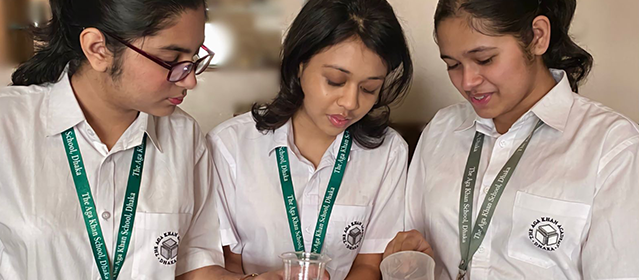
A team of three students from the Aga Khan School, Dhaka in Bangladesh won the Sustainability Award for their investigation into using biodegradable hydrogels to elevate soil moisture quality and reduce water usage, aiding irrigation and crop cultivation.
Inspired by their research into drought and the effects this has on crop yields in their country, team members, Sarah Mushtaque, Shanze Samara Mohsin and Shayantika Ghosh created a stable, semi-permeable and biodegradable hydrogel by combining lime juice, agar powder and water. They then added this to pots containing soil and finally added water. The students measured the mass of these over the course of 10 days and compared them to the mass of pots only containing soil and water.
The experiment showed that soil treated with the hydrogel could retain water better than soil without it, demonstrating its potential use in mitigating drought in the agricultural industry.
Thoroughly impressed by the team’s study, Christine Özden, Global Director, Climate Education at Cambridge said: 'This project really stood out for a number of reasons. The team, through their research, identified the importance of this sustainability challenge for their own country of Bangladesh and wrote with authority on this context. Indeed there was careful consideration at introduction and throughout the write-up, including thoughtful reflections on how this process of using hydrogels to reduce water usage could be scaled up. They had obviously also considered how to make the experiment itself sustainable through the materials used. An impressive project showcasing both scientific and sustainability-related knowledge, skills and understanding.'
Reflecting on the reasons for choosing this as a topic of investigation, Shanze Samara Mohsin said: 'Even within the urbanized cityscape of Dhaka, it's not abnormal to experience having our water supply cut off. Not to mention the thousands suffering from drought in the rural regions of Bangladesh. Hence, to tackle this issue deeply rooted in our society, I wanted to present an avant-garde approach that centered around agriculture, and hydrogels seemed to be the perfect fit!'

